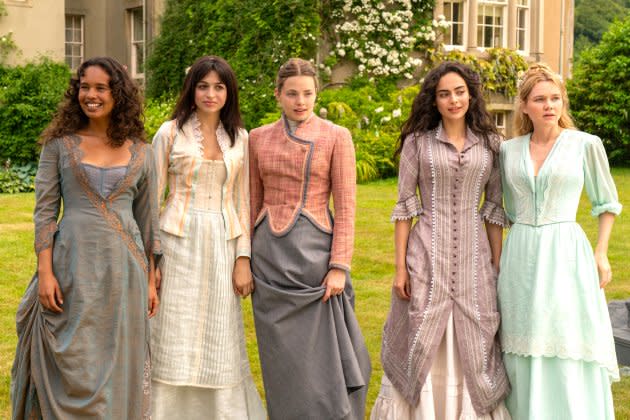‘The Buccaneers’ Is a More Girl-Power ‘Bridgerton’
- Oops!Something went wrong.Please try again later.
- Oops!Something went wrong.Please try again later.

Women in late-Victorian England are expected to wave gently, smile politely, and follow their husband’s orders. They’re not expected to splash around in neighboring lakes, shotgun glasses of champagne or uncross their legs in elaborate ballgowns, like the five American girls in Apple TV+’s The Buccaneers. Audiences will likely compare the 8-episode series to Netflix’s Bridgerton, as the women search for love and high-ranking titles. The trailer alone explodes with royal balls, suffocating corset gowns, and star-crossed romance.
Where The Buccaneers strays from Netflix’s steamy Regé-Jean Page and Phoebe Dynevor-starring show, which made viewers look at Taylor Swift’s “Wildest Dreams” in an entirely new light, is in how it examines the violent clash of “new money” Americans and British elites, and how five girls, bonded by friendship, overcome the British cultural norms of shame and suppression in the 1870s.
More from Rolling Stone
'1989 (Taylor's Version)' Outsells Original Album for Debut Week
Sheryl Crow Welcomed Into Rock Hall by Stevie Nicks, Olivia Rodrigo
The Beatles, Megan Thee Stallion, Olivia Rodrigo, and All the Songs You Need to Know This Week
The series is a loose adaptation of Edith Wharton’s final novel The Buccaneers, which was unfinished and published in 1938 following Wharton’s death. Created by Katherine Jakeways and directed by Susanna White (Andor), the series kicks off with the almost canceled marriage of boisterous American Conchita Closson (Alisha Boe) and Lord Richard Marable (Josh Dylan). Burdened by an unborn child and the ensuing judgment from a conservative, royal household, the newlyweds head across the Atlantic to England. Her best friend Nan St. George, played by Kristine Frøseth, along with their four other young female pals, follow Conchita to stuffy, aristocratic England to find a match in the London marriage market.
Though initially uninterested in regal men, Nan finds herself in a love triangle with Guy Thwarte (Matthew Broome) and – accidentally – the Duke of Tintagel (Guy Remmers). As the season progresses, the American teens in The Buccaneers deal with sexual violence, domestic abuse, identity crises, and humiliation. Conchita, meanwhile, struggles to determine if she and her baby will ever be accepted by the predominantly white royal society, and Nan must contend with the shame of her family heritage. Their American manners and strong-willed personas brush up against uptight, closeminded royal society.
At first glance, the series appears like a TV-14 rendition of Bridgerton (ejaculation plays far less of a role). Both shows are laced with feminist undertones, sharp wit, minutes-long confessions of love, and music scores from contemporary pop artists. (Bridgerton had Billie Eilish and Ariana Grande orchestrations, and The Buccaneers boasts Olivia Rodrigo and Maggie Rogers originals, while both feature the indomitable Taylor Swift.)
Like Bridgerton, The Buccaneers delivers a debutante ball where Jinny (Imogen Waterhouse) and Lizzy (Aubri Ibrag) wear feathered headpieces and numbered placards, with cheeky Nan comparing the paraded girls to cattle. And a rainy makeout scene between two characters in the third episode feels a bit too familiar to that steamy, soaking-wet scene Daphne and the Duke of Hastings share. Though The Buccaneers also has Mad Men’s Christina Hendricks as Nan and Jinny’s mother, Mrs. St. George.
‘Bridgerton’ had Billie Eilish and Ariana Grande orchestrations, and ‘The Buccaneers’ boasts Olivia Rodrigo and Maggie Rogers originals, while both feature the indomitable Taylor Swift.
Bridgerton, the brainchild of Shonda Rhimes and Chris Van Dusen, is rooted in its diverse casting, weaving Black characters into the royal lineage (lifting a page from Lin-Manuel Miranda’s Hamilton). Queen Charlotte, played by Golda Rosheuvel, was based loosely on the actual Queen Charlotte, who was a woman of mixed racial heritage.
While The Buccaneers also explores matters of race, it mainly focuses on these young American women overcoming sexual assault, violence, and humiliation from a horde of royal elites.
Ultimately, it’s a feminist manifesto for girls eager to find love and adventure, free of the restraints of traditional society. But particularly, it’s that scene in the opening episode where five gals clink their glasses ahead of Conchita’s wedding that resonates the most: We always come first.
Best of Rolling Stone
